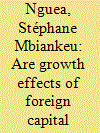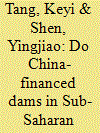| Srl | Item |
| 1 |
ID:
186491


|
|
|
|
|
| Summary/Abstract |
Sub-Saharan Africa's electrification rate of 45% in 2018 remains extremely low compared with other developing regions. This study investigates if foreign capital could significantly contribute to enhancing the electricity access rate in Africa, a subject so far neglected in the literature. Specifically, it seeks to know whether increasing FDI, remittances and foreign aid matter for access to electricity in Africa. We utilize a dynamic panel System-Generalized Method of Moments (Sys-GMM) estimator to analyse data collected on a panel of 36 African countries over 2000–2017. The empirical findings show that FDI and remittances are positively and significantly related to increasing access to electricity. Moreover, our results show that foreign aid reduces the electricity access. We finally find that remittances reduce urban-rural disparities in access to electricity, while FDI and foreign aid increase disparities. These results remain consistent when we perform sub-regional analyses, suggesting that African countries should rely more on remittances and FDI to promote universal access to electricity.
|
|
|
|
|
|
|
|
|
|
|
|
|
|
|
|
| 2 |
ID:
169852


|
|
|
|
|
| Summary/Abstract |
China has become an increasingly important financier of energy infrastructure development in the Global South, especially hydropower projects. Despite an increase in investigations on Chinese models of infrastructure financing in these regions, there is a lack of empirical research on the impacts of the China-financed infrastructure. Using data from Johns Hopkins SAIS CARI China-Africa Loan Database and the Demographic and Health Survey (DHS) Program Database, we estimate the impacts of the China-financed Bui Dam in Ghana. We use two difference-in-differences models to identify change of the likelihood to have access to electricity, and to own several electric appliances among over 29,000 local households receiving electricity transmitted from Bui Dam. We found that after the Bui Dam's completion, the likelihood for households living in the treatment regions having access to electricity increased by about 4 percent. However, our models also show that urban households witness a much higher increase in their ownership of various electric appliances, suggesting that the Bui Dam's improvement of electrification may be predominant in the urban and rich households.
|
|
|
|
|
|
|
|
|
|
|
|
|
|
|
|